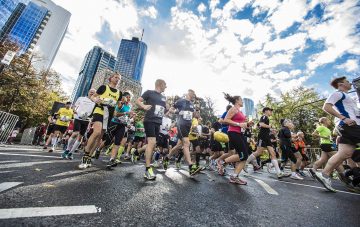Through training in a sober nutritional state or by reducing your carbohydrate intake, many athletes talk about a faster increase of fat metabolism, which results in a higher performance levels. But be careful: Don’t apply this to the wrong use, warns the nutrition expert Dr. Katrin Stücher about the risks as well as for your health and also the sports performance.
Sober training sober approach
The theme training while sober is very present at the moment. The reasons being is that most people think, that this is the best method to increase their fat metabolism. This is the trend for the last 2 years and it began the same time as the “Low-Carb Diet”, meaning provided oneself with very little carbohydrates. I think this trend is stuck in the head of many athletes.
First, the term “sober training” should be explained, since there are different methods to improve the fat metabolism. The sober training takes place like the name states in a sober state. What this means for athletes is after a person wakes up, they should only drink something, but no intake from food and then should start their training.
What happens when training while sober?
In your body, there are 2 reserves for glycogen, the reserve form of carbohydrates: in your liver and in your muscles. Overnight, the glycogen in your liver sinks. This glycogen in your liver serves to keeps up the sugar levels and also supplies the brain and the red blood cells and nerve cells with glucose. Whoever trains in a sober state, such as cycling or running, is training with a near empty liver glycogen reserve. To keep the brain supplied and the blood cells and nervous system, can your body in an emergency state start to break down ketones and from this get the necessary energy needed.
This situation should not be so long, since the body is very strained and delivers less energy efficiency. Why training in a sober state, your blood sugar level is very low. This can lead to an increase in concentrations problems. That’s why one should choose wisely when cycling or running mornings, because tripping over roots can be avoided. Also, by training in the weight room, such as curls, bench pressing etc., is it even more important to pay attention.
What should one pay attention to by training when sober?
A sober training should be a maximum of 90 min. One who does this longer brings their body to extreme low sugar levels. First sign of this is sweating, heart palpitations, paleness around the lips and nose, ravenous appetite, concentration problems, dilated pupils and shaking. It the symptoms increase because of the last of energy to the brain, the results can be headaches, and or speech and sight problems. Regarding the performance increase, is this risk by training while sober, that even though they improve their fat oxidation rates and fat metabolism, intensive training session are neglected, so that the Basic Condition level 1 is no longer possible in a sober state.
Fat metabolism training: Doesn’t always have to be in a sober state.
More often, the term to the topic fat metabolism training is often misunderstood. A sober training is the sober training that takes place in the morning. This is only one way to improve your fat metabolism. The fat metabolism, can also be trained in a non-sober state. Important here is that 1 to 2 hours before the training, not to intake anymore carbohydrates. If you can train in the limits of 60 to 70 percent of your maximum oxygen intake, you can optimize your fat metabolism.
Interesting are some studies, that showed how the carbohydrates intake during that training, did not affect the fat oxidation rate and with this, to improve the fat metabolism, you can add carbohydrate power to your drink bottle.
Suggestions for the training practice.
A fat metabolism training, doesn’t always have to be sober in the morning. I suggest 80% of the weekly trainings sessions to be trained in the Basic Condition Level 1 level and 20 % should be in an intensive level. Like I stated before, one can generally say, that with an improvement of the fat metabolism, that the carbohydrate metabolism worsens.
This is why it is important not to leave out any metabolism trainings and to find a healthy compromise that your body orthopedically and muscularly can withstand. One shouldn’t do more than 1-2 sober trainings sessions weekly. That means, the other trainings sessions should take place in Basic Condition Level 1 and only take place with an filled up liver glycogen reserve.




















